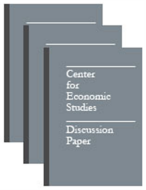Community Determinants Of Immigrant Self-Employment: Human Capital Spillovers And Ethnic Enclaves
Community Determinants Of Immigrant Self-Employment: Human Capital Spillovers And Ethnic Enclaves
Abstract
I find evidence that human capital spillovers have positive effects on the proclivity of low human capital immigrants to self-employ. Human capital spillovers within an ethnic community can increase the self-employment propensity of its members by decreasing the costs associated with starting and running a business (especially, transaction costs and information costs). Immigrants who do not speak English and those with little formal education are more likely to be self-employed if they reside in an ethnic community boasting higher human capital. On the other hand, the educational attainment of co-ethnics does not appear to affect the self-employment choices of immigrants with a post-secondary education to become self-employed. Further analysis suggests that immigrants in communities with more human capital choose industries that are more capital-intensive. Overall, the results suggest that the communities in which immigrants reside influences their self-employment decisions. For low-skilled immigrants who face high costs to learning English and/or acquiring more education, these human capital spillovers may serve as an alternative resource of information and labor mobility.




